Feeling on edge? These foods have been shown to help reduce anxiety

According to the Office for National Statistics, over half of us have ‘high’ levels of anxiety – with women reporting higher levels of anxiety than men. The number of people in the UK using antidepressants to combat anxiety is soaring, with research from Bupa showing that the UK is struggling with anxiety more than ever. Talking therapies are booked up. And more and more of us are turning to alternative ways to help reduce anxiety – including addressing our diet.
Building on an increasing amount of evidence that suggests good nutrition significantly supports our mental health – plus the fact that studies show stress makes us crave junk food – we know that our diet has the ability to both help and hinder our mental health. But what about eating for anxiety? Could healthy, mood-boosting foods directly affect anxiety symptoms?
The link between the gut and the brain
Dr Uma Naidoo, psychiatrist, professional chef, nutrition specialist and author of Calm Your Mind with Food – which delves into how food and nutrition can be used as tools for calming the mind and controlling anxiety – says that food has a huge influence on our brains thanks to the gut-brain axis (a two-way connection between the brain and the micro-organisms in the gut, facilitated by the vagus nerve).
‘Right from childhood, we are taught to eat our fruits and veggies so that we can grow tall, strong and have healthy bodies. However, equally important to know is that the foods we consume have a big influence on our mental health and cognitive function due to the connection between our gut and our brain,’ she says.
‘These organs are intimately related before we are even born, as they develop from the same exact cells in the embryo. Thus, throughout our lifetimes, these two organs remain deeply connected via the vagus nerve, which connects nerve endings in our guts to nerve endings in our brains. Through this gut-brain connection, our gut (digestive tract) and our minds quite literally speak to each other.’
RELATED: The link between gut health and stress
Can what we eat affect the way we feel?
In one word; yes. But, it's complex.
‘This relationship [between food and the brain] is a fundamental mechanism in Nutritional Psychiatry that involves ongoing research,’ says Dr Naidoo. ‘The conversation between these organs is constant. Information from the foods we eat is communicated to our brain and impacts our overall mental health.
‘In fact, did you know that more than 90% of the receptors for the neurotransmitter serotonin, which is responsible for mood and cognition, are located in the gut? Eating patterns high in healthy, wholesome foods are correlated with positive mental health while diets higher in processed, sugary foods are associated with symptoms of poor mental health, such as depression and anxiety.
Amy Reichelt, nutritionist, agrees – pointing out that diets high in refined carbs and sugars can be bad news for the brain in several ways.‘Fluctuations in blood glucose levels can affect mood stability due to rapid spikes and crashes in blood glucose, which may exacerbate anxiety symptoms.’
RELATED: 8 nutritionist-approved mood-boosting foods for slump season
How can our diet affect anxiety?
In Nutritional Psychiatry, one method to address symptoms of anxiety is strategically done by addressing gut health, explains Dr Naidoo. ‘Many individuals that express anxious feelings can testify that an anxious mind brings about a nervous stomach – sometimes referred to as butterflies in the stomach! The gut-brain connection reveals the interconnectivity of these two organs and the notion that the health of one directly influences the health of the other. Additionally, the microbiome, one’s unique collection of gut microbes, can be a strong contributor to anxious symptoms.’
Inflammation in the gut
‘When inflammation is present in the gut, which results from an overgrowth of unhealthy bacteria, inflammation is similarly driven in the brain,’ says Dr Naidoo. ‘When inflammation is present in the brain, stress and anxiety can arise, especially when this inflammation becomes chronic.
‘Considerable evidence tells us that brain inflammation is increased in those with anxiety, so understanding which foods are most inclined to contribute to chronic inflammation and avoiding them, is a powerful step for soothing an anxious mind.’
RELATED: 11 brain foods to eat for better mood and memory
For all these reasons, consuming an abundance of the below foods, while reducing intake of sugary and processed foods, can help reduce symptoms of anxiety for an improved sense of calm and focus....
10 foods that reduce anxiety fast
Blueberries
Blueberries are packed with antioxidants and rich in magnesium, which help protect your cells from stress and can ease feelings of depression.
Nutritionist Dr Daryl Gioffre says: ‘I refer to blueberries as “brainberries”, because of their high antioxidant content which strengthens the brain and reduces oxidative stress in the body. Blueberries are also a good source of fibre, vitamin C, and vitamin K.’
‘Blueberries specifically contain one of the highest concentrations of anxiety-reducing anthocyanin, a powerful antioxidant that supports brain health by fighting off oxidative stress,’ adds Dr Naidoo. ‘Wild blueberries even have twice the antioxidant power of regular blueberries. However, raspberries, blackberries and strawberries are all great fruits to reach for when feeling anxious. I love having a quarter cup of blueberries daily as part of a brain-healthy breakfast.’
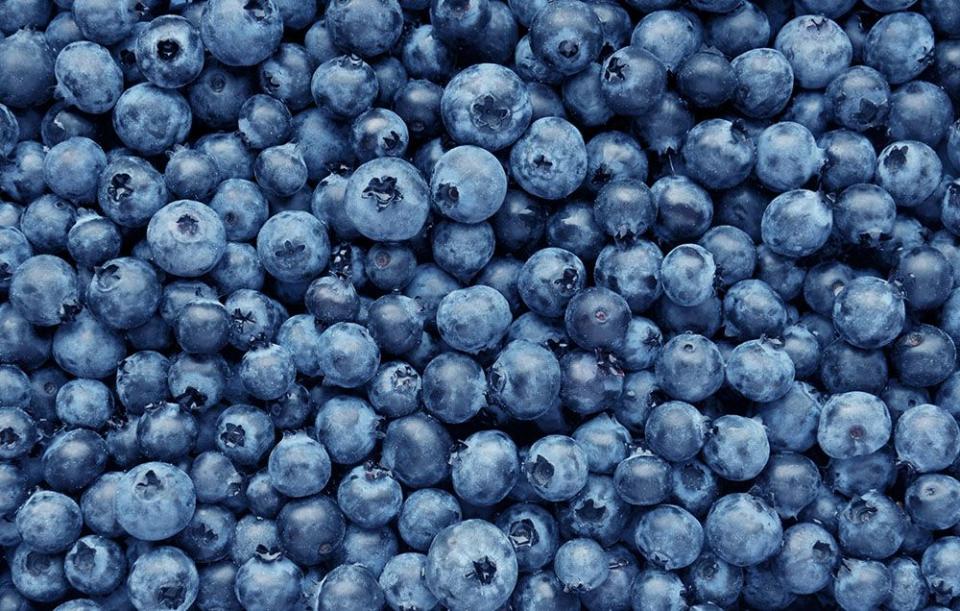
Leafy greens
Spinach and Swiss Chard are naturally rich in magnesium and can make you feel calmer. One 2018 study showed that spinach has anti-stress and anti-depressive properties, while another study noted that college students felt calmer, happier, and more energetic when they ate more vegetables - specifically dark leafy greens, carrots, and cucumbers.
‘Veggies are rich in prebiotic fibres that feed and help maintain an abundance of healthy bacteria in the gut which is associated with reduced neuroinflammation and stress,’ says Dr Naidoo.
‘Prebiotic foods include asparagus, garlic, onions, leafy greens, artichokes, legumes, mushrooms, and apples, amongst others. I recommend including a variety of these veggies in the diet to ensure a diversity of brain-boosting vitamins and minerals along with fibre.’
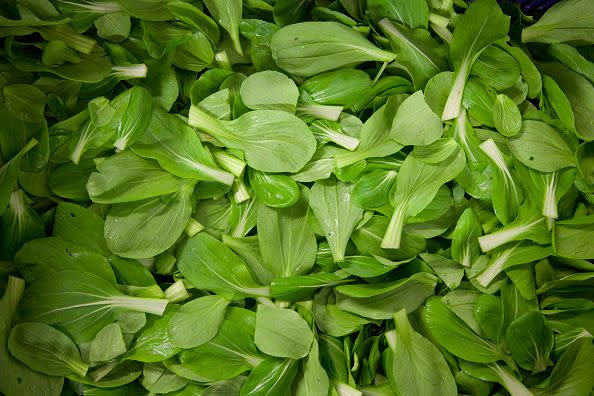
Dark chocolate
Dark chocolate is a great source of magnesium and has been shown to help alleviate stress and anxiety. Due to the flavanols in dark chocolate (which help to stimulate nitric oxide production in the body), it also has been shown to help lower blood pressure and boost blood flow to the heart and brain.
Dr Daryl Gioffre says: ‘Eating dark chocolate will increase the levels of magnesium in your body, reducing the fight or flight response, and calming your stress and anxiety.’
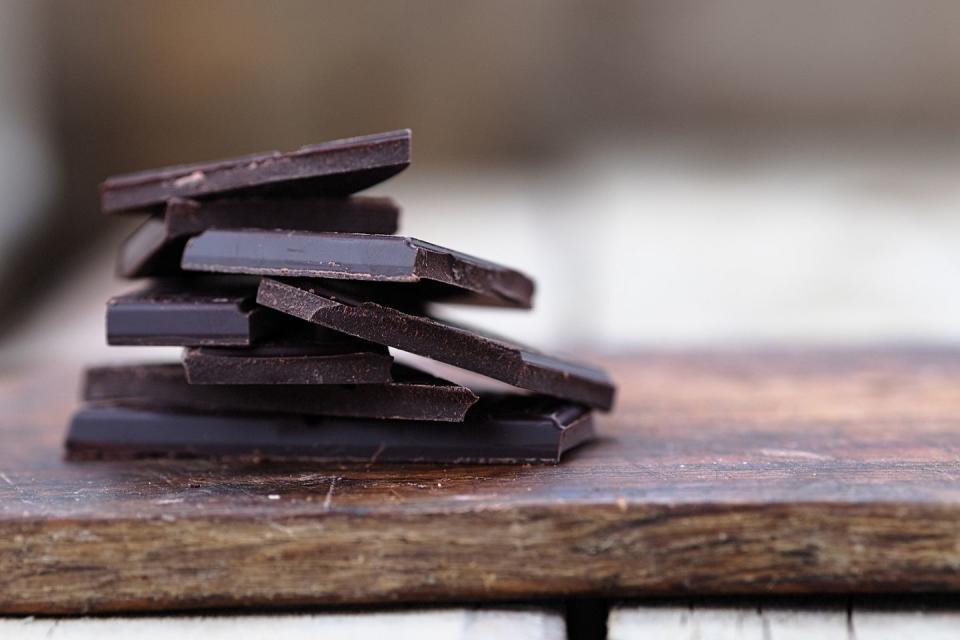
Oysters
Oysters are a potent source of omega-3 fatty acids, which a study by the National Natural Science Foundation of China found were effective in safely curbing depressive symptoms. Minerals like zinc are found in oysters and can help relieve stress. However, if you’re not a fan of them, you can get zinc from eating cashew nuts, liver, beef, poultry, or eggs.
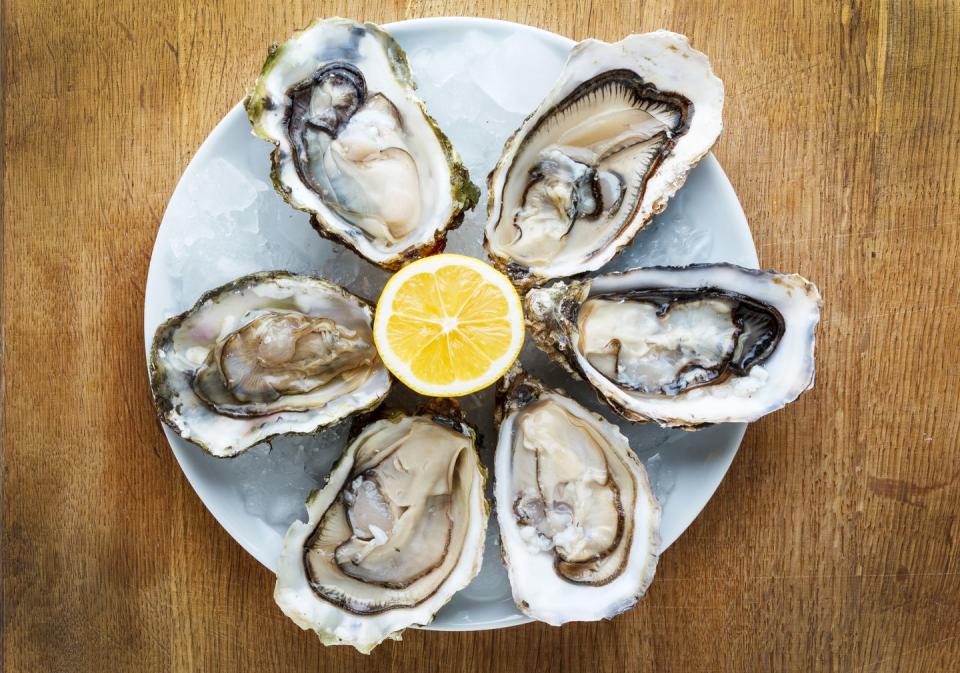
Calcium-rich foods
According to a 2022 study from the journal Nutrients, calcium-rich foods – like dairy, cheese and yoghurt – may help reduce anxiety. The researchers collated data from 1,233 college students and found that those who ate more dairy and calcium were less stressed than others. They also noted that increased calcium intake often resulted in less anxious feelings and more resilience.
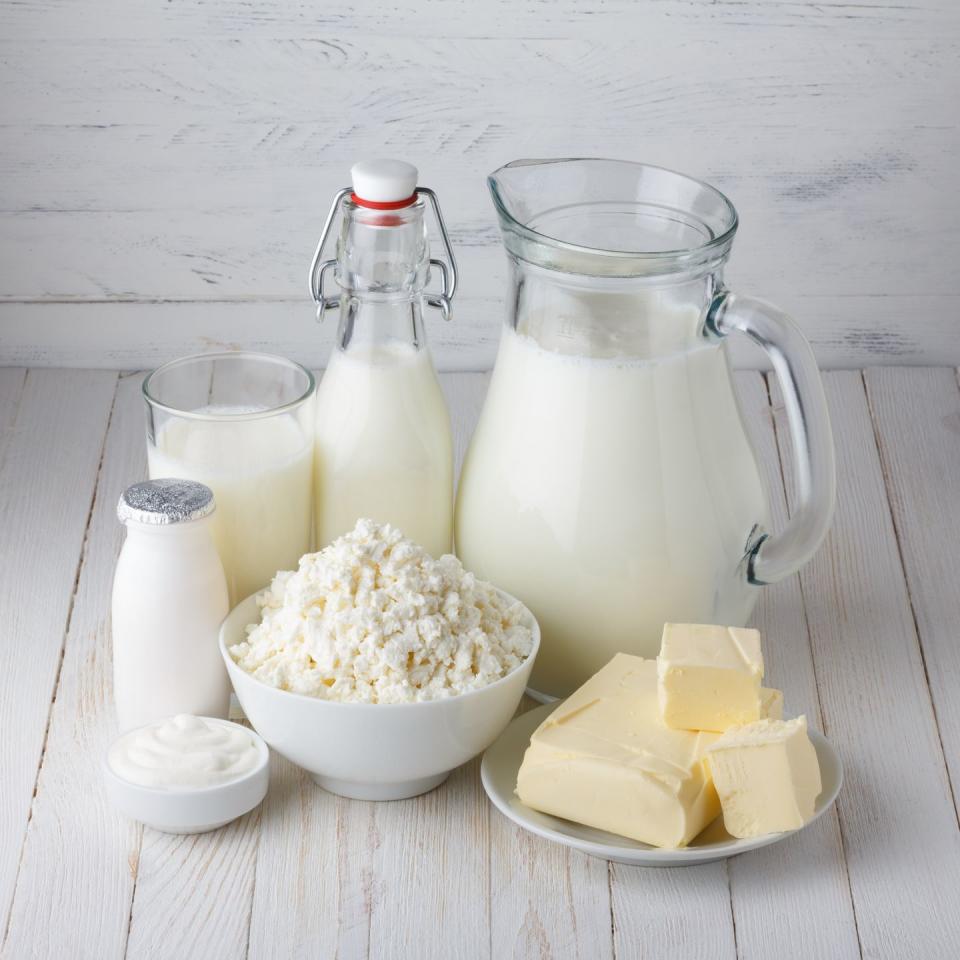
Fish
Salmon, mackerel, sardines, trout and herring are all rich in Omega-3 and fatty acids. According to a randomised controlled trial, anti-inflammatory omega-3 oils, found in oily fish can reduce symptoms of anxiety up to 20%.
‘Omega-3 fatty acids are an incredibly powerful tool in reducing inflammation in the gut and brain. They can be found abundantly in wild-caught fish like salmon, anchovies, tuna, mackerel, and sardines, as well as in nuts and seeds like walnuts and chia seeds. Omega-3 consumption is associated with reduced anxiety, brain fog and cognitive decline, as well as improved mood,’ says Dr Naidoo.
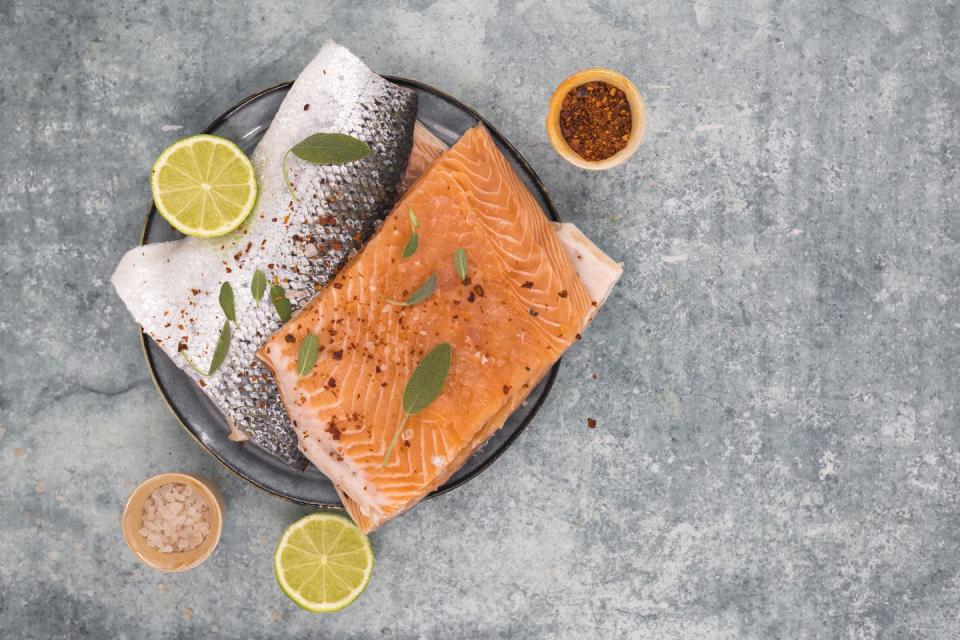
Avocado
Rich in vitamin B – which has been shown to help reduce stress and anxiety – avocados release neurotransmitters such as serotonin and dopamine.
Dr Daryl Gioffre says: ‘Avocados are loaded with calming minerals and B-vitamins which decrease tension in muscles and body. It’s also a healthy plant-based keto fat, which will help reduce sugar cravings, and move your body into a fat-burning state that gives you better energy to do more in your day.’
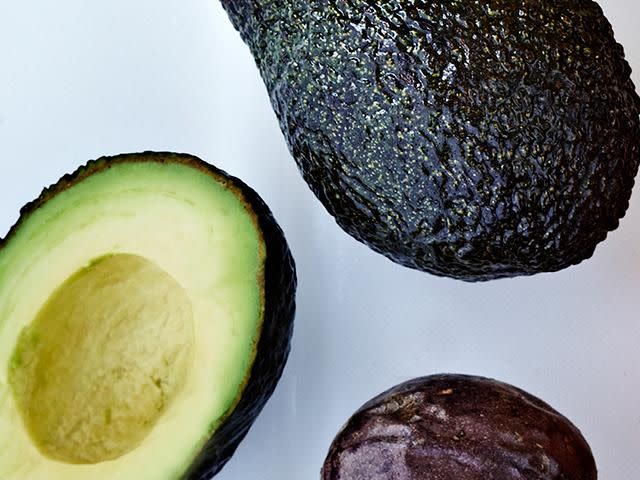
Chamomile Tea
Known for its calming effects, chamomile tea is a great way to alleviate anxiety symptoms.
According to a 2019 systematic review and meta-analysis, drinking chamomile tea can help with both insomnia and relaxation. In a randomised trial, it showed after 2–4 weeks of treatment with chamomile, people with anxiety saw significant improvement in symptoms.
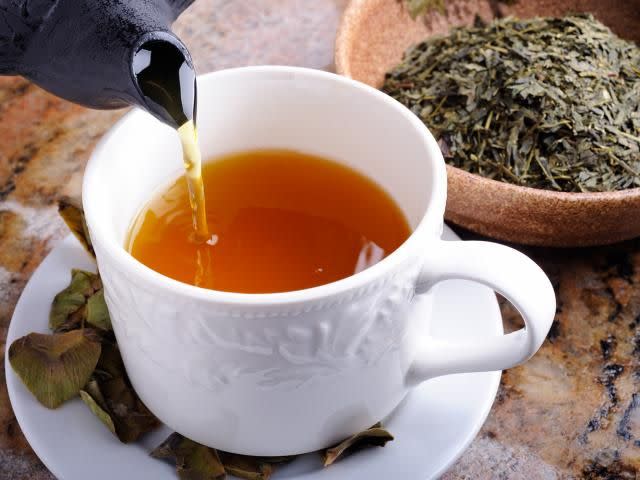
Turmeric
Research on turmeric may be just as bright and hopeful as its cheery sunshine yellow colour. According to a 2017 meta-analysis review, the compound curcumin – found in turmeric — can be used as a safe and effective natural treatment option for depression.
‘Tumeric has antioxidant and anti-inflammatory properties, which reduces anxiety by elevating our feel-good neurotransmitters such as serotonin, a hormone that lowers stress, and helps to regulate your mood, and even sleep,’ says Dr Gioffre.
‘Spices like turmeric with a pinch of black pepper, cinnamon, saffron, rosemary, and ginger not only boost the flavour and colour of our meals but are also rich in antioxidants, micronutrients and anti-inflammatory compounds for improved mental fitness,’ adds Dr Naidoo. ‘Enjoying my turmeric latte each morning is one of my go-to practices for reduced stress and good energy throughout the day.’
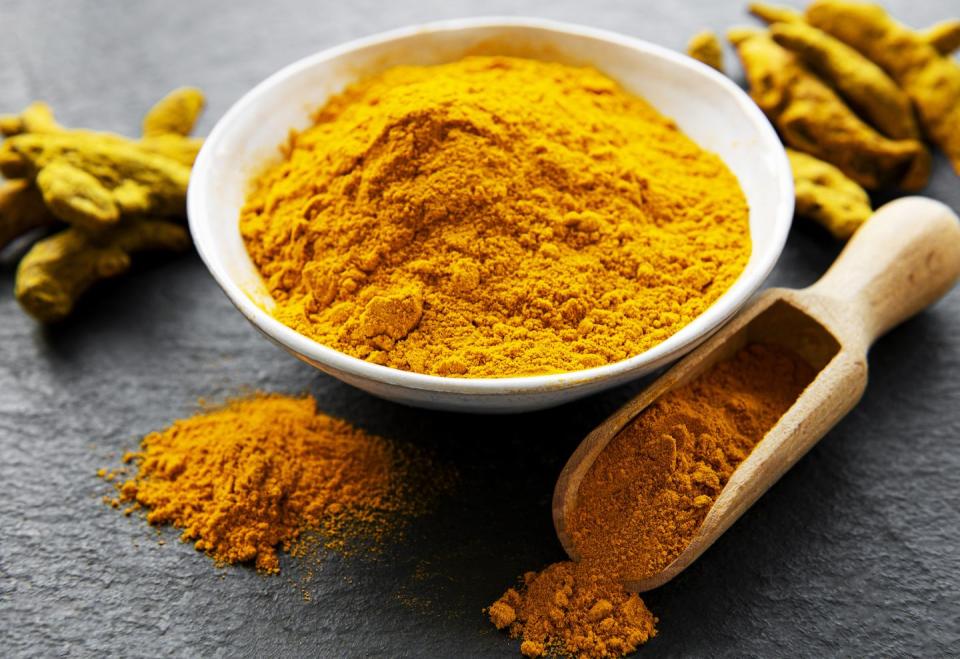
Asparagus
Asparagus — which is rich in potassium, folate, fibre, vitamins A, C, E and K – is also known to reduce anxiety.
Various studies have linked anxiety and depression to folate deficiency. And asparagus contains two-thirds of your daily recommended folate intake.
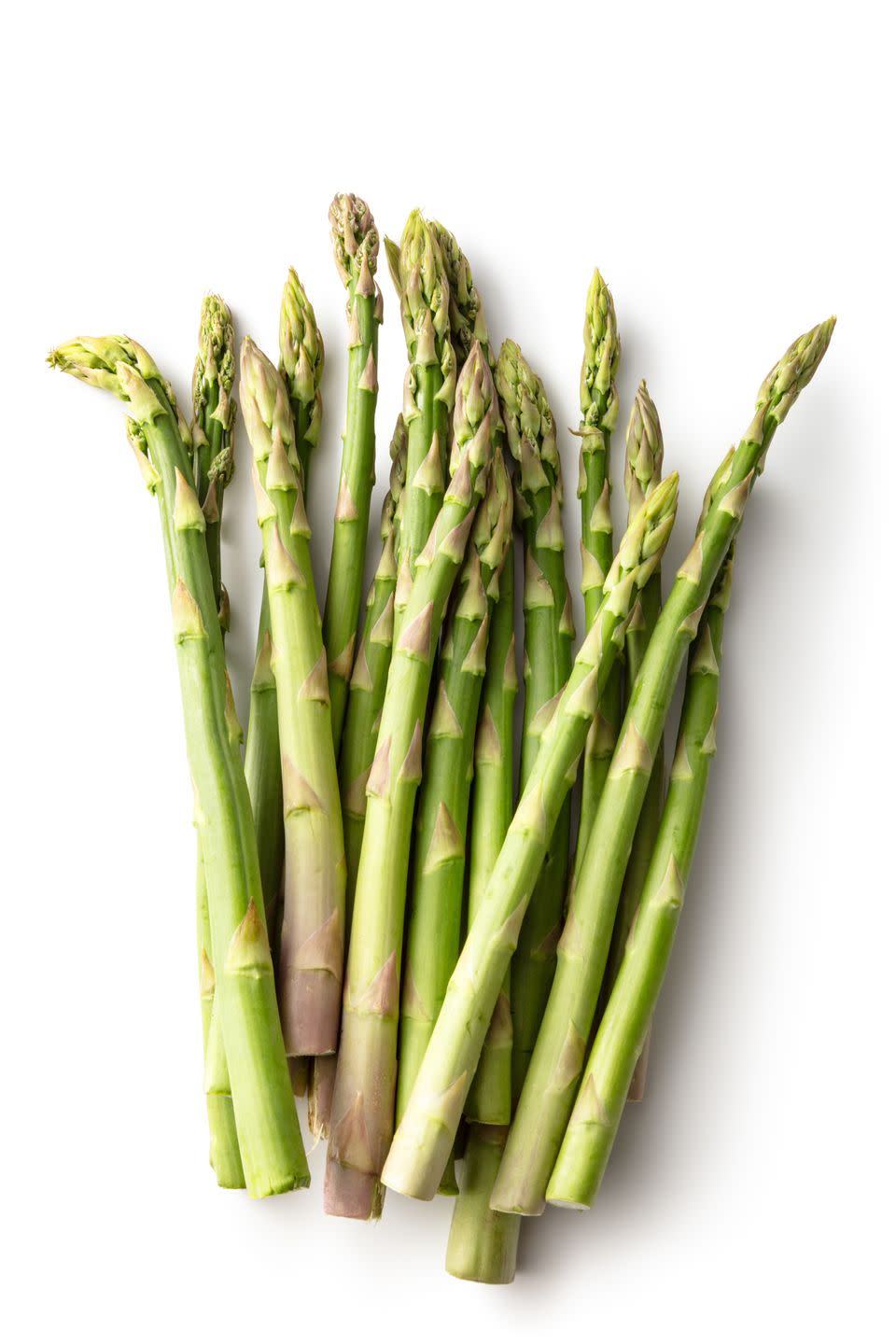
The bottom line
If you’re struggling with an anxious mind, try to focus your diet on wholesome, fibre and nutrient-rich foods with plenty of healthy fats and clean proteins.
‘This supports reduced levels of inflammation and stress, while also supporting satiety so we don't reach for anxiety-inducing foods like sugar-sweetened beverages and processed snacks,’ says Dr Naidoo.
“Empowerment with this knowledge and a careful consideration of one’s body intelligence is key for making healthy food choices and resisting symptoms of anxiety.’

Read next
There are many health benefits of vitamin D, but what is the best time to take it in order to maximise the mental and physical benefits?
We asked a health writer to quit caffeine for a week and report on the side effects. Here’s how she got on.
One of the most popular 'reset' trends these days? The 75 Hard challenge. But what can you eat on 75 hard, exactly, and what does it all involve?
There is a scary amount of contradictory health information online. Dr Idrees Mughal (aka Dr Idz) gives us the low down on how to spot health misinformation online.

You Might Also Like


